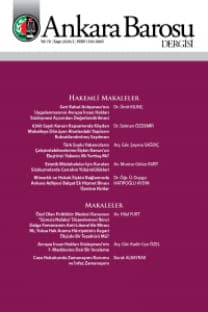YUNANİSTAN (TEMYİZ MAHKEMESİ) 514 VOIOTIA MAKAMI V. ALMANYA FEDERAL CUMHURİYETİ (DISTOMO KATLİAMI DAVASI)
Temmuz 1944’te Yunanistan’daki Alman işgal kuvvetleri, Distomo köyünde yaşayan 300’den fazla kişiyi katletmiş ve köyü yakıp yıkmıştır. 1995’te Yunan mahkemeleri huzurunda Almanya’ya karşı dava işlemleri başlatılmış ve katliam kurbanlarının 250’den fazla akrabası, kaybedilen yaşamlar ve mallar için tazminat talebinde bulunmuştur. Livadia Mahkemesi, Almanya’yı sorumlu tutmuş ve davacılara tazminat ödenmesine karar vermiştir. Almanya, Yunan mahkemelerinin yargılamasından bağışık olduğu gerekçesiyle temyize gitmiştir. Temyiz dörde karşı yedi oyla reddedilmiştir. Yunan mahkemeleri davaya ilişkin yargılama yapma konusunda yetkili bulunmuştur. Mahkeme Başkanı da dahil olmak üzere dört hakim Almanya’nın yargı bağışıklığı olduğunu belirterek karara muhalif olmuştur. Onlara göre silahlı çatışmalardan kaynaklanan talepler, Devletin Yargı Bağışıklığına İlişkin Avrupa Konvansiyonunda ve Devletlerin ve Mallarının Yargısal Bağışıklığına Dair Birleşmiş Milletler Sözleşmesi Taslak Metininde haksız fiilden kaynaklanan taleplere ilişkin bağışıklığın istisnalarından biri olarak yer almamaktadır. Bu terim geniş anlaşılmış ve terimin kapsamına yalnızca devletlerarası ihtilaflar değil, işgal kuvvetlerine karşı silahlı direniş ve direnişe orantısız cevap ayrıca dahil edilmiştir. Dahası, bağışıklığın istisnası bir jus cogens kuralının ihlaline dayanamaz zira böyle bir ihlalin, bağışıklığın zımni feragati olacağına ilişkin uluslararası bir örf ve adet hukuku kuralı yoktur.
Anahtar Kelimeler:
Yargı bağışıklığı doktrini, sınırlı bağışıklık doktrini, jure imperii, jure gestionis, jus cogens
GREECE (COURT OF CASSATION) 514 PREFECTURE OF VOIOTIA V. FEDERAL REPUBLIC OF GERMANY (DISTOMO MASSACRE CASE) 1 (CASE NO 11/2000) GREECE, COURT OF CASSATION (AREIOS PAGOS) 4 MAY 2000
In June 1944, German occupation forces in Greece massacred more than 300 inhabitants of the village of Distomo and burnt the village to the ground. In 1995, proceedings against Germany were instituted before the Greek courts, by over 250 relatives of the victims of the massacre, claiming compensation for loss of life and property. The Court of Livadia held Germany liable and ordered it to pay compensation to the claimants. Germany appealed to the Court of Cassation, on the ground that it was immune from the jurisdiction of the Greek courts. The appeal by seven votes to four was dismissed. The Greek courts were competent to exercise jurisdiction over the case. However four judges, including the President of the Court, concluded that Germany should be entitled to jurisdictional immunity. According to them the exceptions to immunity for claims in tort contained in the European Convention on State Immunity and the United Nations Draft Articles on Jurisdictional Immunities of States did not include claims arising from situations of armed conflict. This term was to be broadly understood and extended not only to conflicts between States but also to armed resistance against occupying forces and the response to such resistance, however disproportionate. Furthermore, an exception to immunity could not be based on the violation of a rule of jus cogens since there was no rule of customary international law that such an infringement constituted a tacit waiver of immunity
Keywords:
Doctrine of state immunity, doctrine of restrictive immunity, jure imperii, jure gestionis, jus cogens,
- ISSN: 1300-9885
- Yayın Aralığı: Yılda 4 Sayı
- Başlangıç: 1942
- Yayıncı: Ankara Barosu Başkanlığı
Sayıdaki Diğer Makaleler
İktidarı Erdoğan’a Teslim Etme Taslağı
Anayasal Devlet Mi ? Anayasası Olan Devlet Mi ?
Belirli Süreli İş Sözleşmeleri
Eczacının 6502 Sayılı Tüketicinin Korunması Hakkında Kanuna Göre Ayıplı İfadan Sorumluluğu
Yrd. Doç. Dr. Burcu G. Özcan BÜYÜKTANIR, Arş. Gör. Dilâ Okyar KARAOSMANOĞLU
2016 Anayasa Değişiklik Teklifinin Değerlendirilmesi
